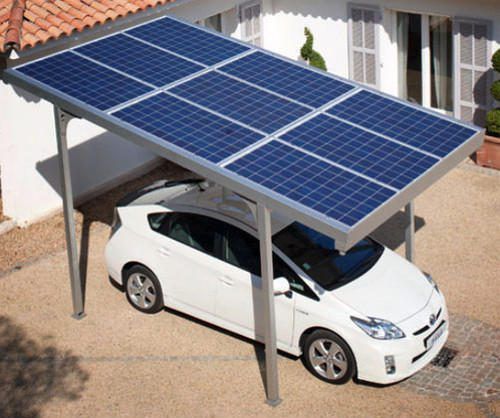Exploring future possibilities of solar-powered electric vehicles.
The world is grappling with the effects of climate change and there's a need for sustainable energy solutions, solar-powered electric vehicle (EV) charging stations are emerging as a promising way to address both issues.


The world is grappling with the effects of climate change and there's a need for sustainable energy solutions, solar-powered electric vehicle (EV) charging stations are emerging as a promising way to address both issues. These innovative charging stations harness the power of the sun to provide clean, renewable energy for electric vehicles, reducing greenhouse gas emissions and promoting the widespread adoption of EVs. As we explore the future of solar-powered EV charging stations, it’s essential to consider the potential benefits, challenges, and advancements in this rapidly evolving technology.
Solar-powered electric vehicles have the ability to reduce carbon footprints associated with traditional fossil fuel-powered vehicles. By utilizing solar energy, these charging stations can provide a clean, renewable power source for electric vehicles, eliminating the need for gasoline or diesel fuel. This not only helps to reduce greenhouse gas emissions but also contributes to improved air quality and reduced dependence on fossil fuels.
One of the main drivers behind the growth of solar energy is the dramatic reduction in the cost of solar panels. Over the past decade, the price of solar panels has dropped by more than 80%, making it more affordable for homeowners and businesses to install solar systems. This trend is expected to continue, with the cost of solar energy predicted to become even more competitive with traditional energy sources in the coming years.
Additionally, solar-powered EV charging stations offer a more cost-effective and sustainable solution for both consumers and businesses. As the cost of solar panels continues to decrease, the initial investment required to install a solar-powered charging station becomes more affordable. Furthermore, the ongoing operational costs are minimal, as solar energy is essentially free once the infrastructure is in place. This can lead to significant savings for consumers who choose to charge their electric vehicles at solar-powered stations, as well as for businesses that opt to install these stations on their premises.
Everything that has advantages comes with some challenges here and there. These challenges have to be addressed to ensure widespread adoption and success of EV adoption globally. One of the primary concerns is the intermittent nature of solar energy, as the sun is not always shining, and weather conditions can impact the efficiency of solar panels. To overcome this issue, many solar-powered charging stations are equipped with energy storage systems, such as batteries, that can store excess solar energy generated during peak sunlight hours for use during periods of low solar output.
Another challenge is the need for a robust and extensive network of solar-powered EV charging stations to accommodate the growing number of electric vehicles on the road. As more consumers make the switch to electric vehicles, the demand for convenient and accessible charging options will continue to increase. To meet this demand, significant investments in infrastructure and technological advancements will be required to ensure that solar-powered charging stations are available in both urban and rural areas.
The future is bright with several developments powered by solar charging stations. One such innovation is the integration of solar panels directly into the roofs of electric vehicles, allowing them to charge while parked or even while driving. This could potentially eliminate the need for dedicated charging stations altogether, making electric vehicle ownership even more convenient and sustainable.
Another promising advancement is the development of more efficient solar panels and energy storage systems, which could further reduce costs and increase the reliability of solar-powered EV charging stations. As technology continues to improve, it’s likely that we’ll see even more innovative solutions emerge to support the growth of electric vehicles and the transition to a more sustainable transportation system.
Solar-powered electric vehicle charging stations hold immense potential for reducing greenhouse gas emissions, promoting the adoption of electric vehicles, and providing a cost-effective and sustainable solution for consumers and businesses alike. It is important to explore the challenges and embrace the advancements that will shape the face of the electric world in the years to come.
What impacts the cost of solar panels?
To install solar chargers there's a lot of work. The price is dependent on your unique situation and factors related to your electricity use and property. Here are some of the top factors to keep in mind that can and do influence the cost of solar panels for your property:
- System size: the bigger your solar panel system, the pricier it will be. Importantly, the average per-unit price for solar decreases with increasing system size.
- Location: pricing varies by state as well, which is a result of both local quoting trends and system size differences – states that have a larger average system size will naturally have a lower average cost of solar.
- Panel brand and quality: like any product or appliance, solar panels come in varying qualities which can be highly dependent on the brand.
- Panel type: the type of panel you install (typically monocrystalline, polycrystalline, or thin-film) directly impacts the overall quality of your installation. Higher quality = higher prices.
- Roof characteristics: the cost of a solar panel installation doesn’t just come from equipment. Your solar installer will also charge for the difficulty of the installation, and having a complex roof might make your system cost more.
- Labor: solar providers all charge different labor rates for their work. You may opt to pay more for a more reputable company with better reviews and a shorter timetable for installation.
- Permitting and interconnection: while it’s not a large factor, paying for permits and your interconnection fee to the grid will add a little to the top of your total solar installation price.
Source:
i) Lawrence Webb (2023) Solar-Powered Electric Vehicle Charging Stations.
ii) Vikram Aggarwal (2023) How much do solar panels cost in 2023?




